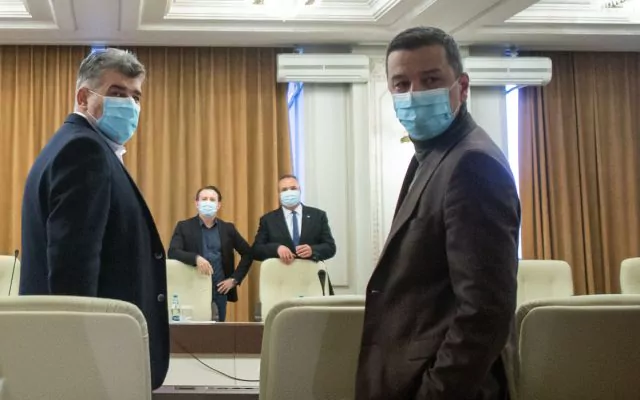The PSD-PNL-UDMR governing coalition, led by Prime Minister Nicolae Ciucă, has drawn up a government program for the period 2021-2024, which provides for an increase in the pension point to 1,586 lei and the minimum pension to 1,000 lei, an increase in the contribution paid to private Pillar II pensions until 2024 and the recalculation of special pensions. The government also wants to change the threshold for taxing micro-enterprises. Please note that the document is a draft and is subject to change.
Urmărește mai jos producțiile video ale Economedia:
- articolul continuă mai jos -
Here are the main provisions of the government program.
Minimum wage
Increase the gross minimum wage to 2,550 lei from 1 January 2022.
Limiting the duration of the minimum wage for one person to a maximum of 24 months, during which time the employer will benefit from state support for the qualification of the employee paid the minimum wage.
Wages public system
Elimination of wage discrepancies in the budgetary system.
An analysis of all categories of bonuses will be carried out, taking into account the conditionality assumed in the PNRR and the negotiations with the European Commission;
Granting a monthly performance bonus to staff who have achieved or directly participated in achieving outstanding results in the work of the public institution/authority or the system to which they belong, have participated in activities of a special nature, have carried out work of an exceptional nature or have had a volume of work significantly exceeding the optimum volume of work, in relation to the complexity of the tasks, on the basis of the criteria laid down by the authorizing officer, subject to the maximum percentage laid down by law;
Pensions
Increase the pension point to 1,586 lei and increase the minimum social allowance from 800 lei to 1000 lei as of 1 January 2022; Support low-income pensioners to overcome the winter period of 2022.
Increase contributions to the 2nd pension pillar by one percentage point from the current 3.75% after the transfer of social contributions to employees to 4.75% in 2024;
As regards the 6 categories of service pensions, they will be recalculated on the basis of the contributory principle, in accordance with the case law of the Constitutional Court.
Amendment of the Tax Code to eliminate the facility of exemption from the payment of the social health insurance contribution for individuals who are pensioners, for pension income exceeding 4,000 lei.
Offshore
Amendment and completion of Law No 256/2018 (offshore law) by the end of 2021. Also, completing the legal provisions for the application of the same tax regime for deep onshore perimeters.
Modular Nuclear reactors on former coal plants
The completion of a first SMR project in one of the Three Seas Initiative (TSI) partner countries is essential to demonstrate the effectiveness of the strategy to replace coal-fired power plants with SMRs. Romania has all the prerequisites for the first SMR development in the region on a 50 Hz system and can become a hub for SMR production in the region, as well as a base for preparing and supporting the operation of this new technology in other Three Seas Initiative countries.
SMRs could be built on existing coal-fired power plant sites, providing a source of clean, carbon-free power generation, maintaining jobs and tax revenues while contributing to the local economy.
Taxation
Review distortions and loopholes in tax legislation, ensuring fairness and equity in the system based on the principle of tax neutrality.
Reducing the informal economy, combating tax evasion, reintroducing withholding tax, tackling the reduction of labor taxation especially in the area of low income should be reviewed in the first year of government.
Reviewing the tax framework
Review the Romanian tax system with a view to developing recommendations to ensure that the tax system contributes to promoting and preserving sustainable economic growth
Entry into force of the amendments to the Tax Code gradually reducing the scope of the special tax regime for micro-enterprises.
Entry into force of: tax incentives to simplify the tax system to make it more efficient, transparent, fair by 2024.
Entry into force of the law to implement a new distance-based taxation system for heavy vehicles (trucks) and the introduction of higher taxes for ownership of the most polluting passenger vehicles (cars/bus/coaches), based on the polluter pays principle and the principle of green taxation.

 Sursa Foto: G4Media.ro/ Autor: Ilona Andrei
Sursa Foto: G4Media.ro/ Autor: Ilona Andrei





























